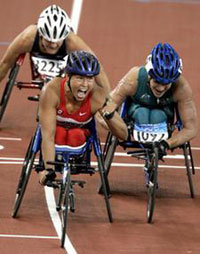A brief history of the Paralympic Games
[ 2006-11-10 11:18 ]
“唤醒思想,解放身体,鼓舞精神”——残疾人运动会格言。
两次世界大战结束后,全球出现了不少残障军民,复健治疗渐渐被重视起来,为了减少因肢体伤残所带来的影响,这些残障者开始接受体能训练,以运动帮助复健以及恢复自信。
1948年,一位为躲避纳粹政府,逃难到英国的德国神经外科医生古特曼博士为二战中脊髓损伤的军人组织了一次运动会,这样,起初的康复性娱乐活动演变为后来的运动比赛,而古特曼也成为了“残疾人运动之父”。

"Awaken the Mind, Free the Body, Inspire the Spirit."--motto of
Paralympics.
The fundamental philosophy guiding the Paralympic Movement
is that athletes with disabilities should have opportunities to pursue their
goals in sport equivalent to those of non-disabled athletes.
The
Paralympic Games represent a commitment to excellence that allows elite athletes
to achieve their personal best. The Paralympic Games exemplify the Olympic ideal
of participation and sportsmanship.
That Paralympic spirit can be traced
to 1948 when Sir Ludwig Guttmann, a German born neurosurgeon who emigrated to
England in 1939as a refugee from Nazi occupation, organized an athletic
competition in Stoke Mandeville for World War Ⅱ veterans with spinal cord
injuries. Four years earlier, at the British government's request to open Stoke
Mandeville Hospital's National Spinal Injury Center, mainly to treat wounded
servicemen, Dr. Guttmann had introduced a new rehabilitation of paralyzed
patients. What began as rehabilitative recreation evolved into athletic
competition with Guttmann emerging as "The Father of Disabled Sport".
A
new page in Paralympic history was written when, in 1988, the Paralympic Games
were held immediately following the Olympic Games in Seoul, Korea, Using the
same facilities as the Olympic Games. Since this date the Summer and Winter
Paralympic Games have followed the Olympic Games utilizing the same venues,
village and in many cases joint sponsors and organizational structures.
(Foreign and Domestic Olympic
Stories)
点击查看更多奥运百科
|